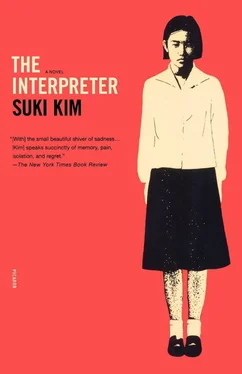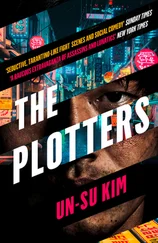Suki Kim - The Interpreter
Здесь есть возможность читать онлайн «Suki Kim - The Interpreter» весь текст электронной книги совершенно бесплатно (целиком полную версию без сокращений). В некоторых случаях можно слушать аудио, скачать через торрент в формате fb2 и присутствует краткое содержание. Город: New York, Год выпуска: 2011, ISBN: 2011, Издательство: Picador, Жанр: Детектив, Триллер, на английском языке. Описание произведения, (предисловие) а так же отзывы посетителей доступны на портале библиотеки ЛибКат.
- Название:The Interpreter
- Автор:
- Издательство:Picador
- Жанр:
- Год:2011
- Город:New York
- ISBN:0-312-42224-5
- Рейтинг книги:3 / 5. Голосов: 1
-
Избранное:Добавить в избранное
- Отзывы:
-
Ваша оценка:
- 60
- 1
- 2
- 3
- 4
- 5
The Interpreter: краткое содержание, описание и аннотация
Предлагаем к чтению аннотацию, описание, краткое содержание или предисловие (зависит от того, что написал сам автор книги «The Interpreter»). Если вы не нашли необходимую информацию о книге — напишите в комментариях, мы постараемся отыскать её.
The Interpreter — читать онлайн бесплатно полную книгу (весь текст) целиком
Ниже представлен текст книги, разбитый по страницам. Система сохранения места последней прочитанной страницы, позволяет с удобством читать онлайн бесплатно книгу «The Interpreter», без необходимости каждый раз заново искать на чём Вы остановились. Поставьте закладку, и сможете в любой момент перейти на страницу, на которой закончили чтение.
Интервал:
Закладка:
Soon she was back on the platform, the Number 7 train platform this time. She could get out at different stops on the Number 7, which would lead to the various neighborhoods where she grew up. Queensboro Plaza, 46th Street, Jackson Heights, Junction Boulevard, and Woodside, although she had never seen the house there. The Number 7 line is for immigrants, the newly arrived immigrants, the ones they call FOB, fresh-off-the-boat, the ones who have to seek out their own kind for a job, a house, everything foreign in this new land. Hardly any whites on the Number 7 except for their seasonal outings to Shea Stadium, and blacks favor the 2, 3, 4, 5, the lines bound for the Bronx and Brooklyn. The Asians rule on the Number 7, mostly Chinese, many Koreans, some Indians, few Hispanics. Even the subway regulations on the steel door are written in Chinese.
When Suzy hopped into the last carriage, there weren’t many people at all, despite rush hour. Immigrants keep different hours. Nine-to-five is a luxury. Rush hour is only relevant to the commuters with desk jobs. Suzy slouched in the empty seat in the middle, not knowing where she planned to go, why she got on to begin with. There was a couple sitting opposite her. A pair of high-school sweethearts, a willowy Chinese girl with shiny braces and bell-bottom jeans leaning in the arms of a Hispanic boy with a pimply face and a diamond stud in his left ear. Times were different now. You rarely saw couples like that when Suzy was growing up. Hispanic boys never looked at her. They might have checked out Grace, but they still wouldn’t ask Grace out—not because they thought she was a bitch, which they might have, but because they just didn’t do that. Different racial groups didn’t mix. In fact, a war was often declared between rival groups. One school would be dominated by the Chinese kids. In another, Puerto Ricans were the bad and popular ones. The mood was multicultural, certainly, but all it meant was that there were fewer white kids, and the rest just stuck to their own. Suzy and Grace moved schools too frequently to really grasp any of it; Grace often broke the taboo, although, for the sort of boys she hung out with, nothing was much of a taboo.
Once the train glided out of Manhattan, it emerged into the open, no more tunnels, no more underground darkness. The sudden sunlight was ruthless. The sallow faces of the passengers became too visible, and the faded graffiti on the walls appeared sad and past its glory. Outside revealed the uneven surface of Jackson Avenue, the first stop in Queens. The gray buildings crammed against the pale-blue sky, and the interweaving highways jutted forth in confused directions. The first stop she recognized as one of her past neighborhoods was Queensboro Plaza, but it was merely a stop, a place where they had lived for less than a year, like all the others. She barely remembered it. Soon the train passed another. But there was no reason to get out, no real recognition that sank into her heart. Woodside was next, where her parents spent their last days. But this was no homecoming. Homecoming didn’t happen on the Number 7 train. When it pulled into its final stop in Flushing and all passengers scattered out, she noticed a man still sitting opposite her. His hand was pointing at his open fly. She quickly averted her eyes while he got up and walked sluggishly to the next car. Suzy sat motionless in her seat, dreading the long return trip back to the city.
“He’s only thirty, a baby really.”
Caleb is now telling her about his new boyfriend, whom he met two months ago. He left the man from the West Village last year. “It just fizzled out. We were like roommates after the first year. He spent all his time trading stocks on the Internet, and I got sick of crying for his dick, which wasn’t much to begin with, really.” Suzy admires Caleb’s way of downplaying everything. She knows that he suffered after the breakup. She knows it was his first love.
“I’m thinking of bringing Rick home for Thanksgiving. I mentioned it to Mom the last time I called her. You know what she said? The phone goes dead for like five minutes, and then she comes back in this super-snotty tone, ‘Must you do that?’ Can you believe it? Must you do that! Sounds almost British, doesn’t it? My mom, the queen of the Japs! She suddenly turns British ’cause she might have to meet her son’s gay lover!”
Suzy stares at Caleb as he chatters away. His parents have finally come around, not fully still, but trying. It’s taken years, but he is talking with them—not every Sunday, not as his therapist had once suggested, but talking. She enjoys Caleb’s stories about his parents. She pretends that it is she who is fighting with her parents, who insists on bringing Damian home for Thanksgiving, who sits here telling whoever how ridiculous, how silly her parents are.
She sips the wine. It’s tart. It tastes of half-ripe raspberries.
“So have you found out if your sister gets a bouquet also?”
Caleb changes the topic, as if sensing Suzy’s mood. He pours more into his glass and also into hers, although she has barely taken a sip.
“No.”
“Does she not talk to you still?”
Suzy shakes her head. Grace, she meant to call Grace today. She wanted to check if Grace had also heard from Detective Lester, if she was also summoned. But Suzy has changed her mind. She has decided to wait until tomorrow morning, when Grace will be gone to school, when she can safely leave a message without having to confront her on the phone. Suzy is afraid of the chilly silence. She is afraid that Grace may just hang up on her. Right after the funeral, right after Suzy moved out of Damian’s house, she had tried calling Grace a few times. She wanted to explain, although there was really nothing to explain. She wanted to talk about their parents, anything that might have happened during the past four years of her absence. Anything at all. But Grace hung up each time. Soon Grace stopped picking up the phone altogether. The message was clear: Grace did not want to speak to Suzy. With each year, it became clearer that Grace intended never to speak to Suzy.
“She’s family. This will pass. It can only pass.”
Suzy is comforted by Caleb’s optimism, although she does not believe it. The thing about newer friends is that they have so little reference. You might give them the synopsis of the life you’ve led up until the point when they met you. But it doesn’t quite sink in, not really. How could it? Your past is only a story for them.
“I don’t think she’s ever liked me.”
She did not mean to say it. Why say it? The truth might even stick and become truer.
“Why do you think that?”
“I just do,” Suzy whispers, sharpening the end of the cigarette against the edge of the ashtray. The ashes fall, and the flame comes alive. Suddenly the orange-red tip of the cigarette looks almost transparent.
With Mom and Dad gone most of the day—sometimes through the night, depending on their job of the moment—the only one Suzy had was Grace. Yet they were never close, never comrades. It is impossible to tell why. It wasn’t even jealousy. Sure, Grace was better in many ways, prettier, smarter, and often wiser. But jealousy would only happen if the sisters were willing to engage with each other. No, their distance has had nothing to do with jealousy. There has never been any room for warmth between the two. They had different friends. Grace knew boys; Suzy didn’t. Grace’s favorite book was Moby-Dick, which Suzy gave up after trying the first few pages, bored and confused. Grace had a life outside school. Suzy could not even fathom where she would go. They shared bunk beds always. Grace on top, because she said that she didn’t want anyone seeing her when she was asleep. When she was not whispering into the phone with one of her many secret boyfriends, she would disappear up there and read. Grace was always reading. Even when Dad got drunk one night and ripped down her posters of Adam Ant and Siouxie and the Banshees, Grace did not flinch but climbed up to her bed with a book. When she was grounded for being found naked with a boy in the back of a car, she repeated, “Sorry, I’ll never do it again,” with not a hint of regret on her face, and read for a month straight. She read just about anything. Novels, newspapers, sometimes even the Sears catalog or a copy of the neighbor’s TV Guide . She would flip through them for hours, which seemed unfathomable. Suzy once made the mistake of buying her a book and spent most of her allowance of twenty dollars for a new edition of Anna Karenina. Suzy could not decide what to pick at first, but she thought that the cover looked mature and that Grace might like the fact that it had originally been banned in Russia. It also looked promising that the volume was impossibly thick, like Moby-Dick. Grace, though, was hardly grateful. She handed it back to Suzy without a word. When Suzy began protesting, Grace said quietly, “I don’t want you choosing my books.” They were only about fourteen or fifteen then. That was the first time Suzy suspected that it wasn’t about books after all. Grace’s obsessive reading might not have had anything to do with books. It didn’t matter what she read, as long as she was left alone. Reading was a refuge, a shield, an excuse to avoid facing the family, and Grace would not let Suzy be an accomplice.
Читать дальшеИнтервал:
Закладка:
Похожие книги на «The Interpreter»
Представляем Вашему вниманию похожие книги на «The Interpreter» списком для выбора. Мы отобрали схожую по названию и смыслу литературу в надежде предоставить читателям больше вариантов отыскать новые, интересные, ещё непрочитанные произведения.
Обсуждение, отзывы о книге «The Interpreter» и просто собственные мнения читателей. Оставьте ваши комментарии, напишите, что Вы думаете о произведении, его смысле или главных героях. Укажите что конкретно понравилось, а что нет, и почему Вы так считаете.












